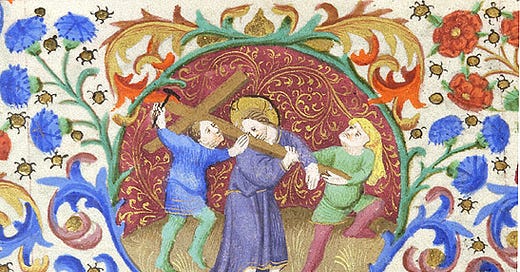Hora prima ductus est Ihesus ad pilatum,
ffalsis testimoniis tradunt accusatum,
In Collo percuciunt manibus ligatum,
Vultum dei conspuunt, lumen deo gratum.
v. Adaramus te, criste, & benecimus tibi,
Quia per crucem tuam redemisti mundum.
At prime crist þe Iewes: Bi-fore Pilat gunne drawe,1
ffalslich þei him a-cuiseden: Wiþ mony a wikked sawe;
Þei spitteden in his feire face: Þe men wiþ-outen lawe,
Ne woulde þei neuere blinne: Til þei hedde him slawe.
Ihesu, my dere lemmon,
Blo for-bled was þi bodi: Þi brigte Rode was al won.
v. Crist, honoured mote þou beo,
Þat bouȝest al þe world on treo.
or. Lord Ihesu, godes sone: Þat sunful mon wolt not tyne,
Bi-twenen vr soules and þi dom: Puttest þe in hard pyne:
Þi Cros, þi deþ now and euere: And at vre endyng-tyme
Graunte liuynde men: Grace and Merci þyne;
To dede, reste and pardoun;
To Churche, pes, loue in londe: To sunful, contricioun.
v. Cristes passion, heuene kyng,
Bring us to blisse þat is wiþ-outen endyng.
Vernon Manuscript, 14th century2
For unfamiliar vocabulary, please see Middle / Early Modern English Glossary in the “Reference & Guides” section of the Peregrinus page. “þ” = “th”; “ȝ” = “g” or “gh” in the middle of a word, “y” or “g” at beginning.




